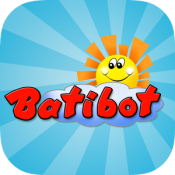Batibot (1985–2002)
PCTF decided to produce its own show titled Batibot and debuted in February 1985. [9] Batibot was conceptualized and produced by Feny Delos Angeles-Bautista, a teacher from the Community of Learners Foundation and writer Rene Villanueva. Unlike the bilingual (Filipino and English) Sesame!, Batibot was done entirely in Filipino and featured stories in a Philippine context. An arrangement with CTW was made in order for the characters Pong Pagong and Kiko Matsing to continue their appearance including one human character Kuya Mario.
Airing on weekdays with a time slot of 10:30 AM, [10] [11] the series consistently ranked in 1985 among the top 10 daytime shows in the Philippines, outdoing the ratings of Sesame! and Sesame Street , which first aired in the country in 1970. [9]
By February 1989, the producers were experiencing financial constraints which placed uncertainty regarding the future airing of the show. [8] PCTF were in negotiations for an Indonesian version of Batibot; coincidentally, CTW were also in negotiations for an Indonesian version of Sesame Street. Shortly thereafter, CTW informed PCTF of their decision to repossess the characters Pong Pagong and Kiko Matsing. PCTF negotiated with CTW for the continued use of the characters for four more years under a license arrangement. Despite, the extension to use the characters, PCTF decided to phase out their appearances because of the costs. [3] In 1994, Pong Pagong and Kiko Matsing were returned to CTW's new management. [5]
In 1999, Batibot was relaunched as Batang Batibot airing on a Saturday morning timeslot. [12]
Batibot ended its run on June 30, 2002. [13] [14] [4] [15]

